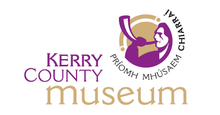Kerry County Museum
 From Wikipedia the free encyclopedia
From Wikipedia the free encyclopedia
Príomh-Mhúsaem Chiarraí | |
 | |
 | |
| Established | 1992 |
|---|---|
| Location | Tralee, County Kerry, Ireland |
| Coordinates | 52°16′01″N 9°42′21″W / 52.2669°N 9.7059°W |
| Type | County museum |
| Public transit access | Tralee railway station |
| Website | kerrymuseum |
Kerry County Museum (Irish: Príomh-Mhúsaem Chiarraí) is a museum located in Tralee, County Kerry, Ireland. The museum is based in the Ashe Memorial Hall, formerly also known as the Urban Council Chambers[1] in the centre of Tralee. The aim of the museum is to collect, record, preserve and display the material heritage of County Kerry.
History
[edit]Before World War I, Kerry County Council was based in a purpose-built building on Godfrey Place; however the building was set on fire by the Black and Tans during the Siege of Tralee of November 1920.[2] In the mid-1920s, it was agreed to new commission a new municipal meeting for use by both Kerry County Council and Tralee Urban District Council.[3] The site they selected had formed part of the estate of Henry Clements-Finnerty which incorporated the ruins of a 17th century castle built for the Denny family.[4]
A new building, which was dedicated to the memory of the republican Thomas Ashe, was designed by Thomas Joseph Cullen in the Neo-Georgian style, built in ashlar stone at a cost of £32,480, and was opened in 1928.[5][6][7] The design involved a symmetrical main frontage of 13 bays facing onto Denny Street. The central section of five bays, which was slightly projected forward, featured a doorway with a rectangular fanlight flanked by a moulded surround and brackets supporting an entablature. The building was fenestrated by pivot windows with painted window sills on two floors. The central section featured an attic level with small rectangular windows. There was a parapet and a hipped roof above.[8]
After the county council moved to County Hall, and the urban district council moved to purpose-built offices in Prince's Street,[9] the building fell empty in January 1989.[10] Kerry County Museum was established in the early 1990s as an initiative of the urban district council to exhibit the material heritage of County Kerry.[11] In the early years the museum focused on exhibited Kerry's archaeological treasures as part of its "medieval experience".[11]
Exhibits
[edit]Exhibits include an early medieval brooch, duelling pistols used by Daniel O'Connell in the early nineteenth century, and an exhibition dedicated to Antarctic explorer Tom Crean.[12]
References
[edit]- ^ The Empire Municipal Directory and Year Book. Municipal Engineering and the Sanitary Record. 1932. p. 125.
- ^ Barrington, T J (1999) [1976]. Discovering Kerry. Its History, Heritage and Topgraphy (2 ed.). Cork: The Collins Press. p. 127. ISBN 1-898256-71-3.
- ^ Potter, Matthew (2011). The Municipal Revolution in Ireland: A Handbook of Urban Government in Ireland Since 1800. Irish Academic Press. p. 328. ISBN 978-0716530824.
- ^ "Tralee Town Park". Kingdom of Kerry. 8 April 2020. Retrieved 30 October 2023.
- ^ McCarthy, Victoria (1 January 2021). "Thomas Ashe Memorial Hall". Gems of Architecture. Retrieved 30 October 2023.
- ^ "1925 – Ashe Memorial Hall, Tralee, Co, Kerry". Archiseek. Retrieved 1 November 2019.
- ^ "Local Authorities". Oireachtas. 26 May 1982. Retrieved 26 October 2019.
- ^ "Ashe Memorial Hall, Town Park, Denny Street, Tralee, County Kerry". National Inventory of Architectural Heritage. Retrieved 30 October 2023.
- ^ "Councillors Say Maybe to Proposed Move to Ashe Hall". Tralee Town. 5 March 2001. Retrieved 30 October 2023.
- ^ O'Shea, Owen; Revington, Gordon (2018). Century of Politics in the Kingdom: A County Kerry Compendium. Merrion Press. ISBN 978-1785372018.
- ^ a b "We collect the material heritage of Kerry, but it belongs to the people". The Kerryman. 12 May 2018. Retrieved 1 November 2019.
- ^ "Kerry County Museum". Discover Ireland. Retrieved 1 November 2019.
